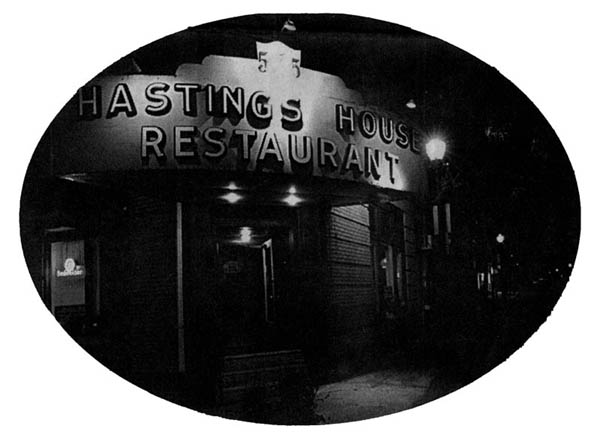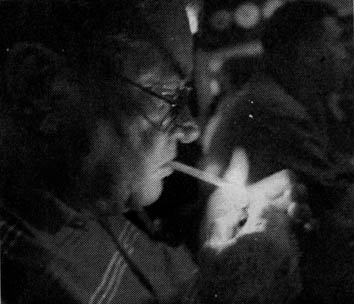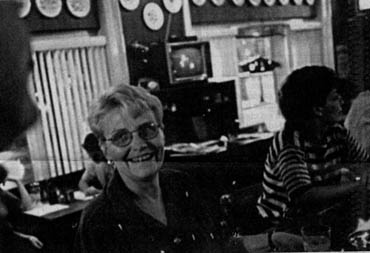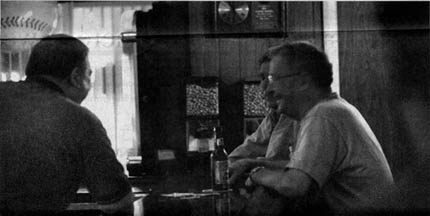

Westchester Weekly Desk; Section 14WC
IN BUSINESS
Where Everybody Knew Your Name
By MAREK FUCHS
01/07/2001
The New York Times
Page 8, Column 2
c. 2001 New York Times Company
HASTINGS -ON- HUDSON -- BACK when this village was teeming with factory workers,
Bernie Hoffman's bar, the Hastings House Restaurant, bustled. The majority of his customers were factory workers from Anaconda Wire & Cable, on the waterfront.
''With Anaconda, we did a terrific business,'' Mr. Hoffman said, happy at the memory. ''Lunch and dinner and bar. I had so many memorable customers.''
Jean Schnibble, a waitress, added, ''You could set your watches by the men that would come in here.''
She, like Mr. Hoffman, spoke of parties and people, now long over and gone. Everyone knew one another too, so if someone drank too much, someone else would carry them up the hill and home.
In the mid-1970's, though, Anaconda Wire & Cable closed. For a while, the old patrons remained in town. Over time, though, most moved or died and, these days, the relative emptiness of the bar puts the historical change of this village in bold relief.
 |
| Bernie Hoffman, the owner, lights up. |
Replacing those who had factory jobs are generally white-collar workers who commute into the city. Few have the time or inclination to stop for a drink between the train station and home. When they do want an after-work drink, they usually get it in the city.
Most nights now, only a sprinkling of people can be seen on the bar stools at the Hastings House. There is also a small, 10-table dining room and a room for parties. But bar drinks account for 70 percent of revenues and since drinks are much higher-margin items than food, they make up an even larger chunk of profits. As the bar goes, so goes the Hastings House.
While the popularity of the bar has changed over time, its look hasn't. When Mr. Hoffman bought the business in 1962, he gave it its current name and refurbished the bar area. A friend of his worked at a wallpaper store that used to be across the street and provided him with a wall mural of the Fulton Fish Market. Four decades later, it is still pasted onto the largest wall. There was a traditional straight bar, and Mr. Hoffman replaced it with the current oblong bar.
The wall hangings were accumulated over the years, many thanks to Mr. Hoffman's ''49 years, coming onto 50'' association with the Hastings Volunteer Fire Department. The upper portion of an entire wall is decorated with fire department plates, made by a customer whose hobby it was to immortalize the trucks and men of local fire departments on plates.
 |
| Jean Schnibble, a longtime employee at Hastings House Restaurant. |
On another wall, there is a prominently featured collection of mugs, all gifts from customers, including Mr. Hoffman's favorite, ''an original Shirley Temple mug.''
There are also trophies on a shelf. ''I sponsored a softball team,'' Mr. Hoffman explained. ''Those are the trophies they left.'' The men on the softball team got older and stopped playing, so none of the championships they commemorate are too recent. Near the door is a fire alarm the size of a public pay phone and there is a single television.
Though Mr. Hoffman, 76, readily admits to the softness of business, he points to a small but steady core of older customers and also an occasional new one.
Bob Kluge is one relatively new arrival. He comes three times a week from his home in the Bronx, because he likes the old-world view from his favorite stool. He always sits facing the front window, which overlooks a ''V.F.W. hall with a grassy hill and a wall on the bottom with kids hanging out.'' Mr. Kluge likes to watch the teenagers, sitting safely at night and having a good time.
And Ted Brown, who moved to Hastings two years ago, said that he stopped in on the first day he was in the village and saw the ''waxes,'' as he described the old-timers who ''spend so much time on the stools, they end up looking like wax figures.'' He didn't think they would warm to him.
''I'm not from here, and most of them were born here,'' Mr. Brown explained, before adding that his worrying was unwarranted. They ''ended up by being warm and friendly, like a little family,'' he said.
Though the number of newcomers isn't enough to make up for his lost customer base, Mr. Hoffman is helped immeasurably by the fact that he owns the building his business is in and doesn't have to worry about paying rent.
Looking forward, since the three-story building sits in the direct center of Hastings, a community with a wealthy population but very limited retail space, one can only imagine what Mr. Hoffman could pocket if he ever put it up for sale. But Mr. Hoffman, sitting on a stool in his bar, which serves as a modest monument to his town's industrial past, does not have his eyes on real estate profits.
Instead, like Mr. Kluge, he is looking at the young whiling the night away outside his window. ''I don't know anyone out on the wall anymore,'' Mr. Hoffman said, smiling sadly. ''Times change.''
| Below, patrons get together to watch TV and talk over a cold drink. |
 |
|
The bar used to attract a larger crowd, back when Anaconda Wire & Cable was still operating. (Photographs by Chris Maynard for The New York Times) |